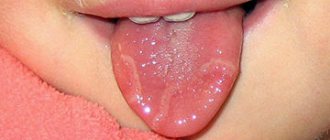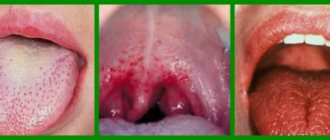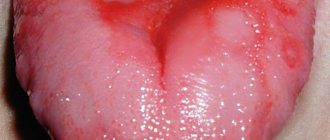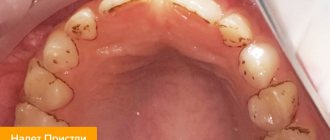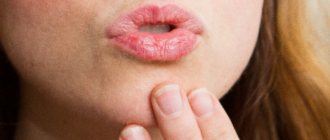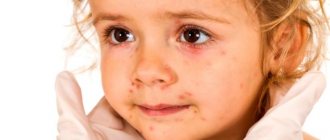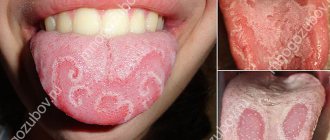Both in the past and now, during an examination, doctors first ask the patient to open his mouth and show his tongue. It assesses the general condition of the patient, the presence of chronic diseases, and identifies disorders of the internal organs. If there are unpleasant sensations, for example, an itchy tongue, then you also need to tell your doctor about this - this is an important symptom, often signaling serious pathologies. What can the itching of the most mobile organ in the entire human body indicate?
The tongue itches - what to do if the organ literally itches
The tongue can itch not only in a figurative sense. If you experience unpleasant irritating sensations, the first thing you should do is figure out what could be the reason for the appearance of this symptom. The organ is a muscle containing a huge number of nerves and blood vessels. The occurrence of discomfort, burning, soreness, swelling and itching in the tongue always indicates some pathological condition, and the symptom itself may be associated with dental disease and disturbances in the functioning of internal organs.
Why might my tongue itch?
In any case, if this symptom develops, you should immediately see a specialist. Further in this article we will find out why the tongue may itch, what preconditions contribute to this, and what to do in such a situation.
Diagnosis of itchy tongue
The first specialist you should contact if such a problem arises should be a dentist. Depending on what the doctor sees and suspects during a visual examination, the following studies may be prescribed:
- laboratory (bacteriological, biochemical),
- cytological,
- microbiological.
If your baby’s tongue itches or burns, it is better to schedule a visit to a therapist or pediatrician. The doctor will decide whether he can help the patient or refer him to other specialists, but only after conducting some research. First of all, they check the blood and urine for sugar. General tests are also required. If, for example, vitamin deficiency or anemia is detected, the therapist will give recommendations on diet and prescribe vitamins.
In the future, if the cause is not determined, you may need to consult one of the following specialists:
- allergist,
- gastroenterologist,
- oncologist,
- neurologist,
- endocrinologist.
They will conduct not only a visual inspection, but also a series of procedures to clarify why your tongue is constantly itching. An allergist may ask you to do tests to determine the allergen. The endocrinologist will definitely find out your blood sugar level and check your hormone levels. A gastroenterologist, suspecting a gastrointestinal pathology, will take a sample of gastric juice for examination.
If, after carrying out all the diagnostic measures, it turns out that all the indicators are normal and there are no somatic diseases, the person gives up - the problem remains, and none of the specialists knows what to do. At this moment, it is important to remember the psychotherapist. Stress and constant worries sometimes provoke the appearance of such an unpleasant phenomenon, and only a psychosomatics specialist can help get rid of them.
What can cause an itchy tongue?
A phenomenon such as itching of the tongue and lips can be caused by one of many different factors. Here are the most common causes of this unpleasant symptom:
- mechanical injury: the tongue of both a child and an adult may begin to itch due to banal biting or damage of another nature, for example, as a result of a burn. Very often, the culprit is rubbing the mucous membrane with the sharp edges of a crown, an incorrectly fitted prosthesis or an incorrectly adjusted brace system. Also, this symptom may well be a consequence of the use of low-quality cosmetics or oral hygiene products,
Tongue injury can cause itching
“Somehow this happened to me too. Right in the middle of the day, for no apparent reason, my tongue itched. And let me tell you, this is not a pleasant feeling! And your hands just reach out to scratch at least a little! In general, I immediately decided that it was because of the spicy food, at home I thoroughly cleaned my tongue with a brush, and in the morning the itching appeared again, and most importantly, only on one side. At lunchtime I ran to the dentist, and he immediately said that it was all about the sharp crown. It apparently became so uncomfortably worn over time, and as a result, it scratched the tongue. This is where it started to itch...”
LudaKam, 31 years old, Saratov, from correspondence on a thematic forum
- Oral diseases: one of the most common causes of itching is a disease such as glossalgia. In this case, it is usually the tip of the organ that begins to itch, but in some cases patients experience severe itching on the sides. Associated symptoms include burning, pain, tingling in the tongue, as well as dryness of the oral mucosa. Quite often, the disease develops against the background of strong emotional experiences and stressful situations, but the disease can also be triggered by injury to an organ, taking certain medications, or malfunctions in the internal systems of the body,
The photo shows glossitis of the tongue - Gastrointestinal pathologies: problems in the gastrointestinal tract in most cases are reflected specifically in the condition of the tongue. For example, pathologies such as gastritis, ulcers or pancreatitis can provoke itching and burning in an organ,
- stress and depression: against the background of severe nervous exhaustion, some changes occur in the composition of saliva and the volume of its secretion,
- deficiency of vitamins and microelements: sometimes due to a lack of B vitamins, iron and folic acid, the tongue begins to itch very much,
- allergy: such a manifestation may well be an allergic reaction of the body to some irritant, for example, to hygiene products, the presence of an allergen in the oral cavity in the form of metal parts of braces or a prosthetic device,
- candidiasis: the development of a fungal infection often becomes the body’s response to a sharp weakening of the immune defense. In this case, along with itching, burning and tingling occurs, and a dense cheesy coating appears. Quite often, the cause of this problem is long-term use of antibiotics. By the way, in children the disease in question develops almost twice as often as in adults.
This is what a fungal infection on the tongue looks like
Other possible provoking factors include the constant irritating effect of tobacco smoke, abuse of too spicy, salty or acidic foods - in such cases, it often begins to tingle and itch directly under the tongue. Excessive consumption of low-quality alcoholic beverages can also lead to the development of this symptom.
Glossalgia - symptoms and treatment
The complaints that patients make are varied. At the same time, they allow one to make a diagnosis quite accurately. With glossalgia, patients usually complain of a burning sensation, tingling and tingling in the tongue area.
Unpleasant sensations can occur either periodically or be permanent. In some cases, patients compare the unpleasant sensations with sensations like eating spicy food . Because of this, some patients note the impossibility of long conversations , as increased fatigue develops.
A large number of patients complain of excessive dryness in the mouth and a small amount of saliva.
During stressful situations, various kinds of anxiety, as well as severe fatigue, the symptoms of glossalgia progress. The burning sensation and pain intensify, and therefore the psychological state of such patients worsens. They become very irritable and whiny. While eating, patients feel relief, discomfort disappears or becomes less pronounced.
Burning and tingling sensations are most pronounced on the lateral surfaces and on the tip of the tongue ; in rare cases, glossalgia appears on the back and root of the tongue. The pain is diffuse. If there is no treatment, the symptoms of glossalgia may disappear and then appear, but in another area of the tongue. This disease also has a tendency to disappear completely on its own.
There are no visible changes in the mucous membrane of the tongue, as well as in the oral cavity, with glossalgia. In some patients, slight swelling of the tongue due to the enlargement of some papillae, as well as a coating, usually white, sometimes yellow , which occurs due to insufficient saliva secretion. In old age, varicose veins of the tongue , which is manifested by a slight enlargement of the tongue and its cyanosis.
As a rule, the neurological status of such patients is impaired. Signs of depression , apathy and fatigue may be present . In contrast, patients may be overly active, agitated, anxious and very suspicious .
Most of these patients suffer from nosophobia, a phobic anxiety disorder manifested by an irrational fear of developing life-threatening diseases. During the conversation, it becomes clear that in addition to glossalgia, the patient has other neurotic conditions - sleep disturbances, fatigue, stool disorders [4][6][8].
Appearance in children
Children often face this problem. The appearance of similar symptoms in a child almost always indicates the development of candidiasis. Here it is necessary to conduct a careful visual examination of the oral mucosa for the presence of a dense white coating with a cheesy consistency - this is the very first sign of the pathology in question. If your baby is still very young and cannot tell you about the symptoms that are troubling him, pay attention to whether he is constantly sticking out his tongue. This is how little children usually make it clear that they feel discomfort in the organ.
Stomatitis is common in infants
A common accompanying symptom is burning, and this is a good reason for parents to worry. Here you need to monitor the child’s psycho-emotional state, make sure that he does not experience any serious worries or stress. If you suspect that the cause of the itching lies precisely in the psychological state of the baby, it makes sense to show him to a neurologist. If the diagnosis is confirmed, the doctor will prescribe a course of sedatives. A childhood disease such as scarlet fever can also provoke itching in the tongue and even in the throat. In any case, if suspicious signs of pathology appear, the child should be shown to a doctor as soon as possible.
Diagnostic measures
The only correct decision regarding the appearance of the symptoms described above is to contact a knowledgeable specialist. Only a doctor can conduct a competent examination and identify the true cause of the discomfort. Thus, the main diagnostic procedures include:
- general blood analysis,
- taking a swab from the throat.
Tests can determine the true cause of the problem.
Having the test results in hand, the doctor can significantly narrow the range of suspected diseases and even immediately make an accurate diagnosis. It is likely that at the stage of identifying the source of the problem, consultation with highly specialized specialists - a dentist, neurologist, gastroenterologist - may be required. Without knowing the exact doctor’s conclusion, you should not make any attempts to solve the problem yourself, otherwise you can only worsen the situation.
Seven signs you have irritable bowel syndrome
Imagine the situation: there are unpleasant symptoms, but a medical examination shows that there is no problem. This is what affects the 6 to 18% of people worldwide who suffer from irritable bowel syndrome (IBS) (1).
Abdominal pain
The cause of pain in the syndrome, which is not accompanied by any significant changes in the digestive tract, is problems with the transmission of signals from the intestines to the brain and back. The coordinated functioning of the digestive tract depends on their coordination. When there is interference in the brain-gut signaling pathway, pain occurs. With IBS, it usually appears in the lower abdomen, and after bowel movement it is significantly relieved.
How to make it easier?
A diet based on limiting the consumption of certain fruits, vegetables, sweets, milk and dairy products, legumes, and flour helps reduce pain in IBS. In addition, the doctor may recommend antispasmodic drugs that specifically relieve pain in the intestines.
Diarrhea or constipation
Impaired intestinal motility that occurs with IBS leads to changes in stool, and in different directions. In approximately 1/3 of cases, the syndrome is accompanied by weakness (2), or simply diarrhea. As a rule, this increases the frequency of trips to the toilet, according to some data, at least twice as much as normal (3). Another trouble is that the urge can arise suddenly, like a bolt from the blue.
Much more often, with IBS, the intestines contract too slowly, and much more fluid is absorbed from its contents than necessary, which leads to constipation. In such cases, the frequency of bowel movements is less than three times a week. Even when a long-awaited event occurs, it often does not bring relief - IBS is characterized by a feeling of incomplete relief. Sometimes constipation alternates with diarrhea.
How to make it easier?
For diarrhea, your doctor may prescribe antidiarrheal medications. To combat constipation, it is important to drink plenty of fluids, eat foods rich in fiber, and, if the problem persists, use laxatives.
Flatulence
Due to poor digestion in IBS, too much gas is produced in the intestines. As they accumulate, they cause discomfort: many patients consider bloating to be one of the most persistent and painful symptoms of the disease. Flatulence is also becoming the most common manifestation of irritable bowel syndrome, especially in women with a predominance of constipation or a mixed type, when the latter alternates with diarrhea (3).
How to make it easier?
Diet helps reduce the severity of bloating, in particular, reducing the proportion of fruits and vegetables, legumes and other foods in the diet that stimulate gas formation in the intestines. To alleviate the condition of already existing flatulence, drugs that have a so-called carminative effect help: they reduce the surface tension of gas bubbles formed in the intestines, which leads to their rupture. The gas itself is successfully absorbed by the intestinal walls or excreted naturally.
Intolerance to certain foods
In the vast majority of cases, manifestations of IBS are associated with errors in diet. Scientists today do not know why certain foods contribute to the exacerbation of the disease. Obviously, food intolerance has nothing to do with allergies and does not, in fact, cause indigestion, but only becomes a “trigger” of the syndrome. It’s interesting that everyone has their own trigger foods, but there are also some patterns. Pastries and cakes, peas and beans, cabbage and plums, and many other gas-inducing foods that contain lactose or gluten can cause a flare-up of IBS.
How to make it easier?
The only solution to this problem is to identify trigger foods and reduce their share in the diet.
Fatigue and sleep problems
In approximately half of cases, IBS is accompanied by fatigue (4), low endurance, which limits opportunities both at work and in everyday life, and the more difficult it is to cope with stress, the more pronounced the symptoms of the disease can be. At the same time, it is not always possible to have a good rest and sleep: difficulty falling asleep and waking up is another characteristic symptom of IBS. By the way, if you spend half the night trying to sleep, it is likely that the next day the troubles will be compounded by an exacerbation of characteristic intestinal problems.
How to make it easier?
If fatigue and insomnia due to IBS are your case, most likely you will have a hard time without the help of a competent neurologist.
Anxiety and depression
It is still unclear what comes first: the symptoms of IBS, which lead to emotional distress, or, on the contrary, stress, which triggers intestinal dysfunction. However, it is clear that those who suffer from IBS are 50% more likely to have an anxiety disorder and 70% more likely to have mood disorders such as depression than those with normal bowel function (5). These are such serious numbers that every person experiencing IBS should carefully monitor their psycho-emotional state and if, for example, depressed mood, loss of self-confidence, unreasonable feelings of guilt, mood swings, or anxiety appear, immediately consult a psychiatrist.
How to make it easier?
In this situation, it is better not to rely on the help of “folk methods” for improving mood - they can only aggravate the condition. Antidepressants and anti-anxiety drugs, which should be prescribed by a doctor, can provide real help.
Sources:
- Sperber AD et al. The global prevalence of IBS in adults remains elusive due to the heterogeneity of studies: a Rome Foundation working team literature review // Gut. — 2017; 66(6):1075–1082.
- Camilleri M. Intestinal Secretory Mechanisms in Irritable Bowel Syndrome–Diarrhea // Clinical Gastroenterology and Hepatology. — 2015; 13(6):1051–1057.
- Portincasa P. et al. Pan-enteric dysmotility, impaired quality of life and alexithymia in a large group of patients meeting ROME II criteria for irritable bowel syndrome // World journal of gastroenterology. - 2003; 9 (10): 2293.
- Han CJ, Yang GS Fatigue in irritable bowel syndrome: a systematic review and meta-analysis of pooled frequency and severity of fatigue // Asian Nursing Research. - 2016; 10 (1): 1–10.
- Janssens KAM et al. Mood and anxiety disorders in chronic fatigue syndrome, fibromyalgia, and irritable bowel syndrome: results from the LifeLines cohort study // Psychosomatic medicine. — 2015; 77(4):449–457.
Marina Pozdeeva, pharmacist, medical journalist
Photo depositphotos.com The author’s opinion may not coincide with the opinion of the editors
Therapeutic measures – complex treatment
In order to get rid of an annoying symptom once and for all, you first need to identify its root cause, and it is this that needs to be treated. Medications may be prescribed as symptomatic therapy. Typically, complex treatment involves taking antihistamines, antipsychotics, immunostimulants and anti-inflammatory drugs. If the patient has a deficiency of beneficial vitamins and microelements, additional multivitamin complexes may be prescribed to strengthen the body's defenses.
Only a specialist can prescribe the correct treatment
If oral candidiasis is to blame, a specialist may prescribe antifungal agents. It is also mandatory to carry out complete sanitation of the oral cavity in order to eliminate any provoking factors. Other methods of relieving acute symptoms include all kinds of baths and applications using medicinal herbs: wheat germ, rose hips, sea buckthorn oil and others. In this regard, rinsing with a soda solution has worked well - one tablespoon per glass of water. However, it should be understood here that the use of any traditional medicine must first be agreed with the attending physician.
Preventive actions
To minimize any risks of developing diseases leading to the symptoms discussed above, you should take care of high-quality and regular oral hygiene. Every day, morning and evening, you should thoroughly clean not only the surface of your teeth, but also your tongue, because a huge amount of bacteria and food debris also accumulate on it. To do this, you can use a regular toothbrush or purchase a special device, such as a scraper.
Regular tongue cleaning will help avoid the problem.
As a preventive measure, from time to time you can rinse your mouth with decoctions of medicinal herbs or special antiseptic solutions, which can be purchased at any pharmacy. And do not forget about the importance of systematically visiting the dentist for preventive examinations.
- Sergeev A.O. Diagnosis and treatment of superficial candidiasis, 2001.
